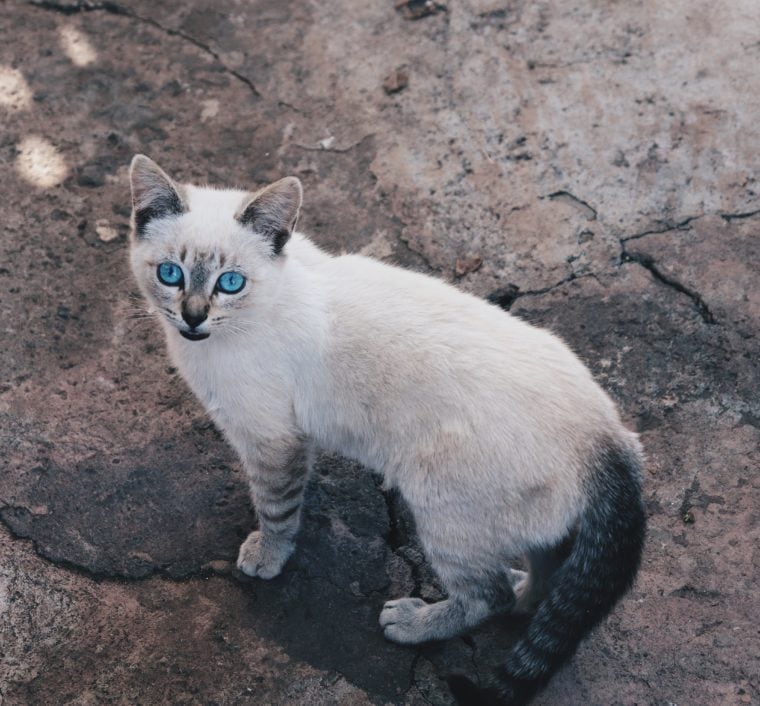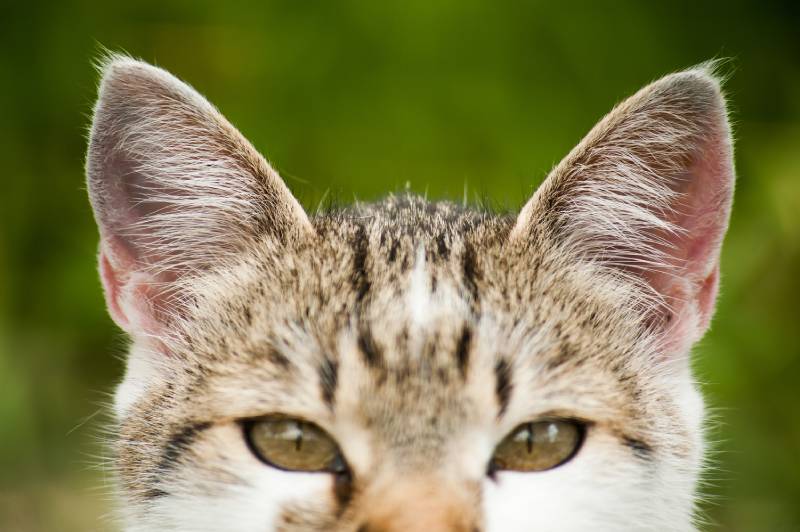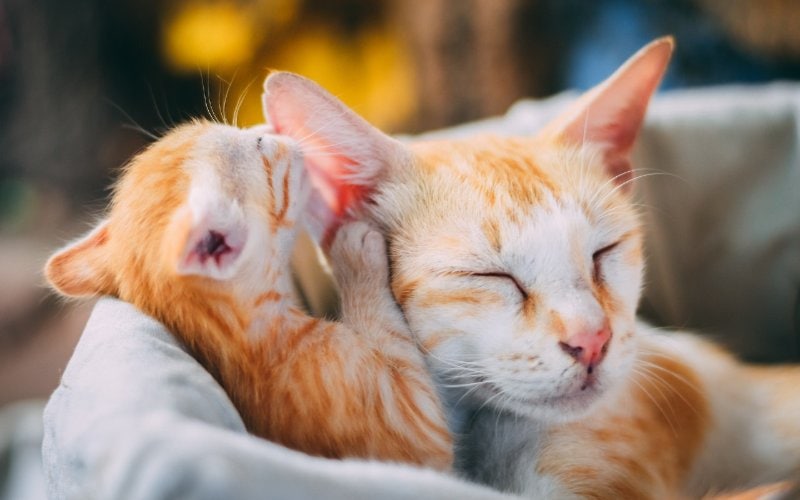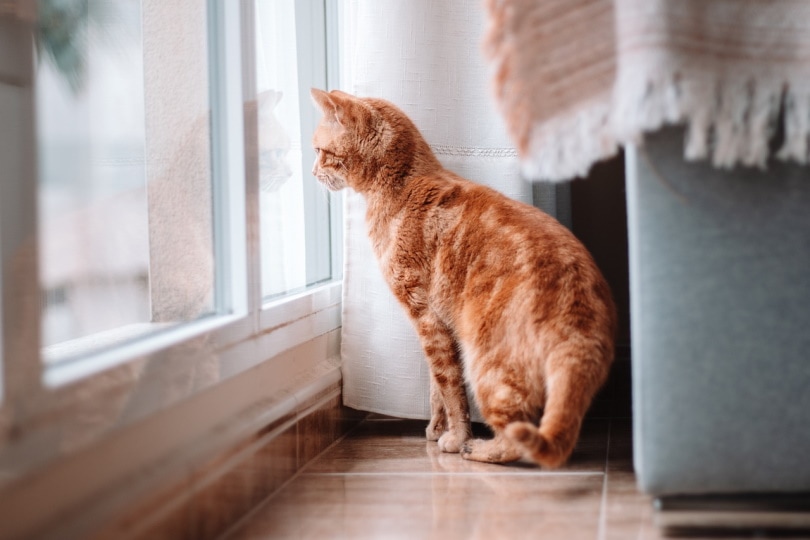
Click to Skip Ahead
Cats have excellent hearing. Their large, funnel-shaped ears have 32 muscles that enable them to move 180 degrees for precise sound location. But even with all that, cats somehow ignore almost every sound we make to get their attention.
If we are honest, most of us have made pretty embarrassing noises that have fallen on deaf ears!
The only sound most cats seem to respond to is “Pspsps.” As many cat owners can attest, it’s the one reliable sound you can make to get your furry friend’s attention. Even the least bothered cats will at least manage a disgusted look in your direction.
But why is that?
In this article, we explore some of these theories in detail. Join us below as we attempt to unravel this age-old mystery.
The 4 Reasons Why Cats Love the “Pspsps” Sound
You are not alone in asking why cats love the “Pspsps” sound. People have wondered about the mystery for many years.
Science is yet to come up with a definite answer. But a leading theory is that cats respond to the “Pspsps” sound because it resembles other sounds they have evolved to detect. Still, others believe cats are generally sensitive to high-pitched frequencies.
Although animal behaviorists have not come up with a definite answer after years of research, it has not stopped people from making educated assumptions or proposing theories.
The following four reasons have come to the fore.
1. They Are Sensitive to High Frequencies
Cats can hear frequencies as high as 85kHZ, while humans can only hear 20kHz or lower. That makes a kitty’s ears more sensitive to high-pitched sounds. As such, they are naturally drawn to the “Pspsps” sound.
If the theory is true, the cat responds to the hissing syllable “s” in particular.
That would explain why cats also respond to versions of the sound “Pspsps” in other languages, such as the Romanian “pis-pis-pis,” Australian “kiss-kiss-kiss,” and German “miez-miez-miez.” All these sounds contain hissing syllables

2. It Resembles Other Sounds in Nature
Another theory suggests that cats respond to the “Pspsps” sound because it mimics other sounds they have evolved to know in nature. Indeed, “Pspsps” resembles prey sounds that a cat would recognize.
It could be the sound of rustling leaves or rodents’ high-frequency sounds. It could also remind the cat of a bird ruffling feathers or an insect buzzing.
The sound might trigger the cat’s predatory instincts, prompting it to investigate its source.
3. It Resembles a Mother’s Call
The “Pspsps” sound resembles a cat’s hissing noise when expressing fear or anger. For example, mothers often make it when warning their kittens of danger.
It is not far-fetched to imagine a cat would remember the sound from its kittenhood days. So, they could respond to the “Pspsps” sound because they associate it with their mother’s hissing.
That could explain why the cat usually runs toward you immediately when you make the sound. It probably associates it with danger already and knows it will be safer around you.

4. It Is a Conditioned Response
Some experts propose that cats respond to the “Pspsps” sound because we condition them to do so, even when we are not aware. The conditioning works the same as with dogs—through positive reinforcement.
Think about it. You often use the “Pspsps” sound when you want to offer your furry friend food or a treat.
Your cat might initially respond to the sound out of curiosity. But repeating it might inadvertently train them to respond every time. That means the kitty is not attracted to the sound necessarily, but to the reward it gets after responding.
Why Your Cat Does Not Respond to “Pspsps”
Not all cats respond to the “Pspsps” sound. So, it shouldn’t be a cause for worry if your cat seems unbothered by your calls. Indeed, several reasons could explain your kitty’s indifference.
Maybe your cat does not associate the sound with anything exciting or threatening. They might have heard it before and got curious but soon became disappointed after running to investigate.
You could also have conditioned the cat to associate the sound with annoyance. Perhaps you only make the sound when you want to pick them up and never offer any treats. That might work the first few times, but the kitty will eventually figure that out.
Another reason your cat might not respond is that they ignore you. Unlike dogs, cats don’t bend over backward to please their owners. They only engage on their terms. And they don’t like being bothered during a nap or when resting.
However, something could be wrong with your cat’s hearing if it habitually doesn’t respond to various calls. So, it would be best to consider consulting a vet in such a case.

Other Sounds that Cats Love
Cats love the “Pspsps” sound almost universally. But they are also attracted to other noises as well. For instance, some cats will respond to all high-pitched sounds, including whistling.
Felines also love any sound that they associate with food or treats. For example, the sound of a can opening or scratching a paper bag could signal the arrival of a delicious meal or treat and send the kitty running to you.
As suggested, cats can recognize sounds that mimic their prey too. That explains why they go crazy for toys that make these sounds.
Playing with a toy is exciting on its own, but the added squeaking sound it makes when being chewed or rolled takes the realism to a new level for your furry friend.
Surprisingly, cats love music as well.
According to a study published in Applied Animal Behavioral Science, cats respond positively to “species-specific” music. They prefer sounds that mirror the tempo and frequency of other cats’ sounds and will purr in excitement or rub against the speakers.
Sounds that Cats Hate
Cats don’t like hissing sounds. So, a rustling paper bag, sprayed aerosol can, or any sound resembling a hiss could set them off.
Cats usually hiss when scaring off other cats. It’s, therefore, no wonder that they would feel threatened, aggressive, or agitated upon hearing the sound. They are likely to associate it with potential conflict or a dangerous situation.
Cats hate loud noises too. That is not surprising, considering felines have sensitive ears. What we may think is loud could be painful to them. Examples include sirens, thunder, vacuum cleaners, drills, garbage trucks, and motorcycles.
A cat has tiny muscles in its third ear that contracts to protect them from exposure to loud noises. However, the reflex might not be quick enough when the sounds come suddenly.
Since cats can hear sounds at higher frequencies than humans, they could be irritated by noises we don’t even hear. For instance, electronic gadgets such as televisions, computers, and remote controls emit high-frequency sounds that cats find annoying.
But even more worrying is that the noise can impact the cat’s health. According to research on mice, noise could interfere with sleep and cause behavioral changes and seizures.
Conclusion
Science has no definite answer on why cats love the “Pspsps” sound. But experts have proposed exciting theories. Some suggest that kitties are drawn to the sound because of its high frequency. And others believe cats associate it with prey noises or their mother’s warning call.
Still, some skeptics only consider it a conditioned response.
It’s imperative to remember that cats have different personalities and can react unpredictably, the same as humans. Therefore, not all will respond to the “Pspsps” sound. Also, those that respond might choose to ignore it sometimes.
Featured Image Credit: Maria Garza, Unsplash






